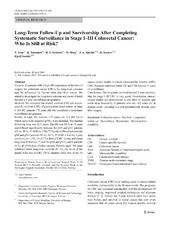| dc.contributor.author | Veen, Torhild | en_US |
| dc.contributor.author | Stormark, Kjartan | en_US |
| dc.contributor.author | Nedrebø, Bjørn Steinar Olden | en_US |
| dc.contributor.author | Berg, Marianne | en_US |
| dc.contributor.author | Søreide, Jon Arne | en_US |
| dc.contributor.author | Kørner, Hartwig | en_US |
| dc.contributor.author | Søreide, Kjetil | en_US |
| dc.date.accessioned | 2016-03-07T13:36:10Z | |
| dc.date.available | 2016-03-07T13:36:10Z | |
| dc.date.issued | 2015-09 | |
| dc.Published | Journal of Gastrointestinal Cancer 2015, 46(3):259-266 | eng |
| dc.identifier.issn | 1941-6636 | |
| dc.identifier.uri | https://hdl.handle.net/1956/11458 | |
| dc.description.abstract | Purpose: In patients with a high life expectancy at the time of surgery for colorectal cancer (CRC), the long-term outcome may be influenced by factors other than their cancer. We aimed to investigate the long-term outcome and cause of death beyond a 5-year surveillance programme. Methods: We evaluated the overall survival (OS) and cancer-specific survival (CSS) of a population-based cohort of stage I–III CRC patients <75 years old who completed a systematic surveillance programme. Results: In total, 161 patients <75 years old, 111 (69 %) of whom were node negative (pN0), were included. The median follow-up time was 12.1 years. The OS was 54 % at 15 years and differed significantly between the pN0 and pN+ patients (65 vs. 30 %; P < 0.001); CSS (72 %) also differed between the pN0 and pN+ patients (85 vs. 44 %; P < 0.001). For the 5-year survivors (n = 119), 14 (12 %) died of CRC during additional long-term follow-up (7 each for pN0 and pN+), and 6 patients (5 %; all pN0) died of other cancers. Patients aged <65 years exhibited better long-term survival (81 %), but most of the deaths were due to CRC (10/12 deaths). Only two of the 14 cancer-related deaths involved microsatellite instable (MSI) CRC. Females exhibited better OS and CSS beyond 5 years of surveillance. Conclusions: The long-term survival beyond 5-year survivorship for stage I–III CRC is very good. Nonetheless, cancer-related deaths are encountered in one-third of patients and occur most frequently in patients who are <65 years old at disease onset—pointing to a still persistent risk several years after surgery. | en_US |
| dc.language.iso | eng | eng |
| dc.publisher | Springer | eng |
| dc.rights | Attribution CC BY | eng |
| dc.rights.uri | http://creativecommons.org/licenses/by/4.0 | eng |
| dc.subject | Colorectal cancer | eng |
| dc.subject | Survival | eng |
| dc.subject | Long-term follow-up | eng |
| dc.subject | Surveillance | eng |
| dc.subject | Recurrence | eng |
| dc.subject | Microsatellite instability | eng |
| dc.title | Long-term follow-up and survivorship after completing systematic surveillance in stage I–III colorectal cancer: who is still at risk? | en_US |
| dc.type | Peer reviewed | |
| dc.type | Journal article | |
| dc.date.updated | 2015-11-10T12:08:08Z | |
| dc.description.version | publishedVersion | en_US |
| dc.rights.holder | Copyright 2015 The Authors | |
| dc.identifier.doi | https://doi.org/10.1007/s12029-015-9723-2 | |
| dc.identifier.cristin | 1253602 | |
| dc.subject.nsi | VDP::Medisinske fag: 700::Klinisk medisinske fag: 750::Gasteroenterologisk kirurgi: 781 | |
| dc.subject.nsi | VDP::Midical sciences: 700::Clinical medical sciences: 750::Gastroscopic surgery: 781 | |
| dc.subject.nsi | VDP::Medisinske fag: 700::Klinisk medisinske fag: 750::Onkologi: 762 | |
| dc.subject.nsi | VDP::Midical sciences: 700::Clinical medical sciences: 750::Oncology: 762 | |

